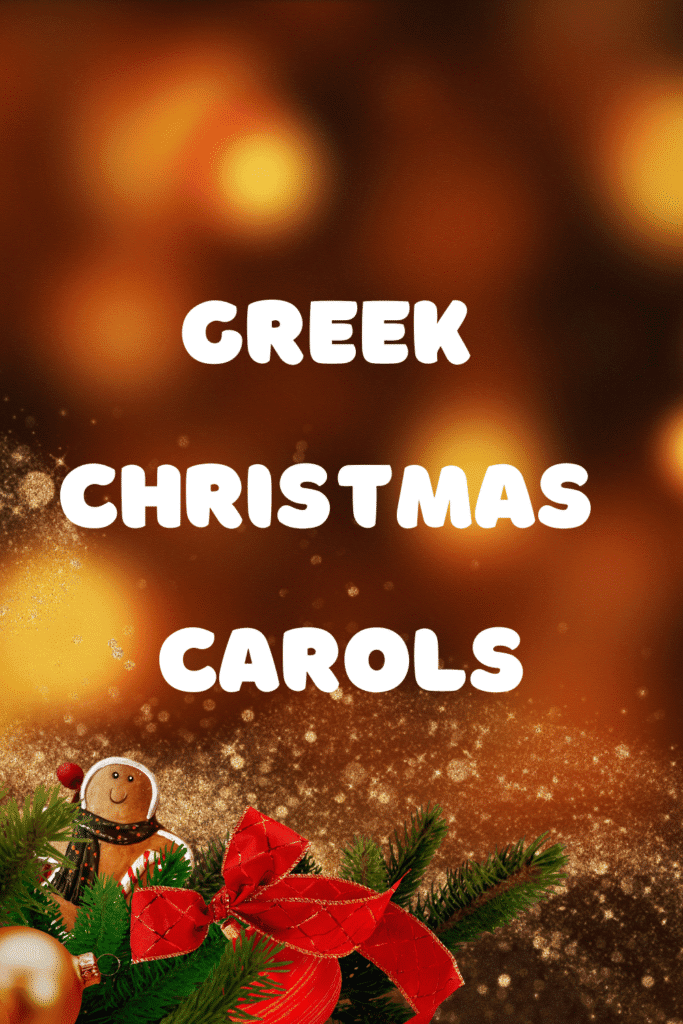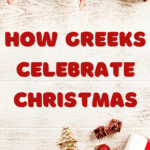In Greece, Christmas isn’t just celebrated with lights, food, and family gatherings—it also comes alive through the sound of κάλαντα (kalanta), the traditional Christmas carols.
These songs, sung by children on Christmas Eve morning, hold a special place in Greek culture, blending melodies with centuries-old traditions.
Let’s explore the history, lyrics, and heartwarming charm of Greek Christmas carols!
A Brief History of Κάλαντα
The word κάλαντα (kalanta) comes from the Latin calendae, referring to the first day of the month in the Roman calendar.
These songs have roots in ancient Greece, where people sang verses to celebrate the winter solstice and offer blessings for the new year.
Over time, these pagan songs merged with Christian traditions, evolving into the κάλαντα we know today.
Most κάλαντα are written in older Greek, reflecting their historical origins.
The lyrics often combine religious themes—like the birth of Christ—with wishes for prosperity and good health for the household.

The Tradition of Singing Κάλαντα
On the morning of December 24th, children across Greece go from house to house singing κάλαντα.
They carry triangles, tambourines, or other simple instruments, adding a joyful rhythm to their performance.
Families welcome the young singers into their homes (or stand at their doorsteps) to listen, often rewarding them with coins, sweets, or even small gifts.
In exchange, the children wish the household health, happiness, and blessings for the coming year.
The Most Popular Christmas Carol
Καλήν εσπέραν άρχοντες (Kalin esperan archontes) is the most beloved Christmas carol in Greece.
Here’s a glimpse at its lyrics:
Καλήν εσπέραν άρχοντες
(kalín esperán árchondes)
Good evening, noble masters,
ἂν εἶναι ὁρισμός σας
(an íne orismós sas)
If it is your wish,
Χριστοῦ τὴν θείαν γέννησιν
(Christú tin thían yénnisin)
The divine birth of Christ
νὰ πῶ στὸ ἀρχοντικό σας.
(na pó sto archontikó sas)
I’ll sing in your noble home.
Χριστὸς γεννᾶται σήμερον
(christós yennáte símeron)
Christ is born today
ἐν Βηθλεὲμ τῇ πόλει
(en vithleém ti póli)
In the city of Bethlehem
οἱ οὐρανοὶ ἀγαλλονται
(i ouraní agállonde)
The heavens rejoice
χαίρει ἡ φύσις ὅλη.
(héri i fýsis óli)
All of nature celebrates.
Ἐν τῷ σπηλαίῳ τίκτεται
(en to spiléon tíktete)
In the cave, He is born
ἐν φάτνῃ τῶν ἀλόγων
(en fátni ton alógon)
In a manger of animals
ὁ Βασιλεὺς τῶν οὐρανῶν
(o vasiléfs ton ouranón)
The King of the heavens
καὶ ποιητὴς τῶν ὅλων.
(ke piitís ton ólon)
And the Maker of all.
Πλήθος ἀγγέλων ψάλλουσιν
(plíthos angélon psálousin)
A multitude of angels sing
τὸ Δόξα ἐν ὑψίστοις
(to dóxa en ypsístis)
The “Glory in the Highest”
καὶ τὸ Ἡρῴδης τάραττεται
(ke to iródis táratete)
And Herod is troubled
σὺν πᾶσι τοῖς Ἰουδαίοις.
(sin pási tis ioudéois)
With all the Judeans.
Ἐκ τῆς Περσίας ἔρχονται
(ek tis persías érchonde)
From Persia they are coming,
τρεῖς μάγοι με τὰ δῶρα
(tris máyi me ta dóra)
Three Magi with the gifts,
ἄστρο λαμπρὸ τοὺς ὁδηγεῖ
(ástro lambró tous odiyí)
A bright star guides them,
χωρὶς νὰ λείψει ὥρα.
(chorís na lípsi óra)
Without losing time.
Sing Along!
Want to learn and sing Greek κάλαντα yourself?
Here’s your chance to join in the fun!
Watch the video below to enjoy traditional Greek Christmas carols and sing along with the lyrics we’ve shared above.
Regional Variations
Every region in Greece has its own unique versions of κάλαντα.
Some feature local dialects, melodies, or additional verses reflecting regional customs.
Here are a few examples:
Cretan Kalanta: Often accompanied by traditional instruments like the lyra, Cretan carols are faster-paced and feature rich poetic imagery.
Pontian Kalanta: Reflecting the traditions of Greeks from the Black Sea region, these carols often include storytelling elements about the nativity.
Epirus Kalanta: Known for their hauntingly beautiful melodies, these carols are slower and more solemn in tone.
Beyond Christmas: Kalanta for Every Occasion
In Greece, κάλαντα aren’t limited to Christmas!
There are also traditional carols for New Year’s Day (Prototronia) and Epiphany (Ta Fota).
Each set of songs carries blessings tailored to the occasion, ensuring the festive spirit continues throughout the holiday season.

Reviving the Tradition in Modern Times
Although the tradition of singing κάλαντα is alive and well, urbanization and modern lifestyles have brought changes.
In cities, children may sing κάλαντα in apartment buildings, while in villages, they often cover the whole neighborhood.
Some even bring speakers or pre-recorded music to enhance their performance!
Whether you hear them in bustling cities or quiet mountain towns, the sound of κάλαντα is sure to fill your heart with the festive spirit of Greece.
For a deeper dive into how Greeks celebrate Christmas, including festive traditions and delicious meals, visit our article on How Greeks Celebrate Christmas.


